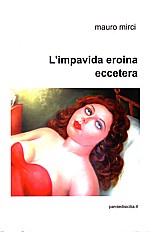
Stephen Dobyns
da Cemetery Nights
TOMATOES
A woman travels to Brazil for plastic
surgery and a face-lift. She is sixty
and has the usual desire to stay pretty.
Once she is healed she takes her new face
out on the streets of Rio. A young man
with a gun wants her money. Bang, she's dead.
The body is shipped back to New York,
but in the morgue there is a mix-up. The son
is sent for. He is told that his mother
is one of these ten different women.
Each has been shot. Such is modern life.
He studies them all but can't find her.
With her new face, she has become a stranger.
Maybe it's this one, maybe it's that one.
He looks at their breasts. Which ones nursed him?
He presses their hands to his cheek.
Which ones consoled him? He even tries
climbing into their laps to see which
feels more familiar but the coroner stops him.
Well, says the coroner, which is your mother?
They all are, says the young man, let me
take them as a package. The coroner hesitates,
then agrees. Actually it solves a lot of problems.
The young man has the ten women shipped home,
then cremates them all together. You've seen
how some people have a little urn on the mantle?
This man has a huge silver garbage can.
In the spring, he drags the garbage can
out to the garden and begins working the teeth,
the ash, the bits of bone into the soil.
Then he plants tomatoes. His mother loved tomatoes.
They grow straight from seed, so fast and big
that the young man is amazed. He takes the first
ten into the kitchen. In their roundness,
he sees his mother's breasts. In their smoothness,
he finds the consoling touch of her hands.
Mother, mother, he cries, and flings himself
on the tomatoes. Forget about the knife, the fork,
the pinch of salt. Try to imagine the filial
starvation, think of his ravenous kisses.
POMODORI
Una donna fa un viaggio in Brasile
per un intervento di plastica e un lifting.
Ha sessant’ anni ed ha il solito desiderio
d’ essere carina.
Una volta aggiustata, porta la sua nuova faccia
fuori, per le strade di Rio. Un giovane
con una pistola vuole i suoi soldi. Bang, lei muore.
Il corpo viene imbarcato per tornare a New York,
ma all’ obitorio fanno confusione. Il figlio
viene chiamato. Gli viene detto che sua madre
è una di quelle dieci differenti donne.
Ognuna è stata uccisa con un colpo di pistola.
Così è la vita moderna.
Lui le studia tutte, ma non riesce a trovarla.
Con la sua nuova faccia è diventata un'estranea.
Potrebbe essere questa o forse quest’altra.
Guarda i loro seni. Quali sono quelli che lo allattarono?
Preme le loro dita sulla sua guancia.
Quali sono quelle che lo consolarono? Prova anche
ad arrampicarsi nel loro grembo per vedere
quale sente più familiare ma
il coroner lo ferma.
Bene, dice il coroner, qual è sua madre?
Tutte lo sono, risponde il giovane, lasciatemi
prenderle tutte in blocco. Il coroner esita
poi accetta. In realtà ciò risolve un mucchio di problemi.
Il giovane riceve a casa le dieci donne,
dopo che sono state cremate tutte insieme.
Avete visto come certa gente ha una piccola urna sopra il camino?
Quest’ uomo ha un’ enorme scatola di latta argentata.
A primavera porta la scatola di latta
fuori in giardino e comincia a mescolare i denti,
la cenere, i pezzettini d’ ossa nel terreno.
Poi ci pianta pomodori. Sua madre amava i pomodori.
Crescono dritti dai semi, così veloci e grossi
che il giovane ne è stupito. Prende i primi
dieci e li porta in cucina. Nella loro rotondità
egli vede i seni di sua madre. Nella loro levigatezza
trova il tocco consolante delle sue dita.
Madre, madre, egli grida, e si avventa
sui pomodori. Dimenticandosi il coltello, la forchetta,
il pizzico di sale. Provate a immaginarvi la filiale
famelicità, pensate ai suoi voraci baci.
(traduzione di Francesco Randazzo)




